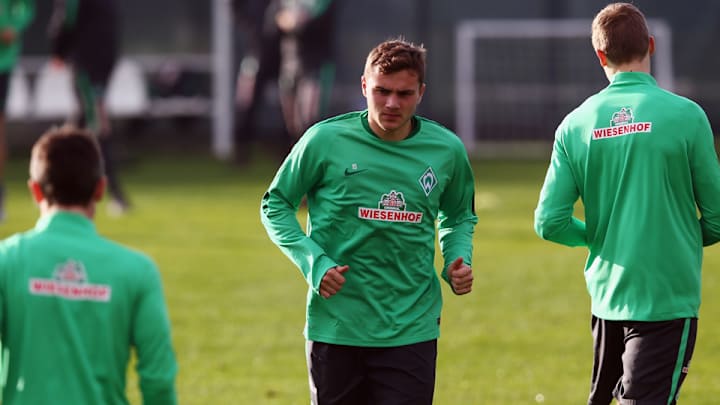Jordan Morris's future in fine shape despite passing on Werder Bremen

Werder Bremen general manager Thomas Eichin could have said anything (or nothing) in Tuesday’s release regarding Jordan Morris, the Stanford University junior and U.S. national team rising star who has rejected the German club’s contract offer. And Eichin chose to say this:
“We're in a situation now where we need players who fully identify with Werder and the way things are done here, in order for them to focus properly on the task ahead.”
Indeed, the 116-year-old club, which has spent only one season in Germany’s second tier, faces a challenge requiring proper focus. Werder (4-10-3) entered the Bundesliga’s winter break on a five-game winless streak that dragged it into the relegation zone. Only one league rival has scored fewer goals this season and only one has yielded more.
It’s understandable why Werder, already the home of injured U.S. forward Aron Jóhannsson, would find Morris appealing. He’s a powerful, efficient and confident striker who appeared at ease playing (and scoring) against Mexico before 64,000 fans only a few days after Stanford’s spring scrimmage against Cal Poly San Luis Obispo. He came recommended by U.S. national team coach Jurgen Klinsmann and assistant Andreas Herzog, a Werder alumnus, and assisted on the only goal in last week’s 1-0 exhibition win over Azerbaijan’s Inter Baku. And as a free-agent American, Morris wouldn’t be cost prohibitive.
But the 21-year-old is a free agent in name only. Morris’s heart remains in his hometown of Seattle, where he’s expected to kick off his pro career. The Sounders literally are family—Morris’s father, Michael, is the club’s medical director—and they remained confident they’d get their man even as Klinsmann and Herzog helped open doors in Germany. Morris spent a year in the Sounders’ youth academy, played for the club’s U-23 team and was offered the richest homegrown player contract in MLS history. Werder could offer more, but this decision wasn’t about the money. It was about where Morris wants to play.
Morris won't miss out on a pro environment in Seattle. It may not be the Bundesliga, but it's a massive step up from Stanford. He'll have plenty to figure out. The Sounders attract big crowds and have experienced stars from whom Morris can learn. And playing time isn’t guaranteed on a team featuring the likes of Clint Dempsey, Obafemi Martins and Nelson Valdez. But careful attention to Morris’s development is. The Sounders have a vested interest in his success—one that goes beyond the dollars. Morris’s progress will be scrutinized and may influence decisions made by prized U.S. prospects down the road.
Those who would argue that Morris is hampering his personal development, and perhaps that of the national team, by choosing Seattle don’t give the player much credit. If his commitment, professionalism and will to improve are high enough, then he’ll adapt, flourish and earn additional opportunities. Perhaps he’ll join DeAndre Yedlin and Fredy Montero as former Sounders now making their way in Europe.
Maybe he’ll find that, like the most prolific scorer in U.S. history, Landon Donovan, he plays his best soccer close to home. Either way, there’s been no correlation between an American player’s World Cup impact and the league in which he plays. Form, fitness and confidence are available on both sides of the Atlantic. There’s a list of U.S. players who’ve been marginalized at European clubs, where continuity and patience are often limited. There’s also a reasonably impressive list featuring those who had lengthy and lucrative careers abroad following some seasoning at home. This decision hasn’t cemented Morris’s long-term future.
As for the national team’s prospects, they depend more on domestic clubs’ ability to identity and develop potential pros than on whether a 21-year-old spends the start of his pro career in Seattle. That development requires money and time. American soccer’s progress always has been tied to evolving culture and demographics. Soccer is the most popular sport in countries that contend for World Cups. And as it grows in the U.S., the competition, know-how and resources required to forge better players should increase. Each man who casts his lot with the league, whether it's a prospect like Morris, a national team hero like Dempsey or a foreign star like Martins, fuels the momentum just a bit.
Morris doesn’t remember a world without MLS. He grew up a Sounders fan. The club means something to him. If there’s any conclusion to draw form Tuesday’s news, it shouldn’t be about Morris or the Sounders or Werder or Klinsmann, who asks only that his players find an environment that will bring out their best. The conclusion should be about the apparent bond Morris feels with his hometown club.
Obviously, MLS, NASL and USL teams can’t just start hiring the parents of every talented kid within reach. But they can work harder to invest in their communities, build a culture of connection and create real competition and opportunities for local players. As roots deepen and domestic clubs become more popular, they'll be more likely to develop and then be able to sign players like Morris. Bonds and bucks will increase in tandem. And American soccer will benefit, both on the weekends and every four years.
It’s worth noting that Eichin also said, “We will remain in close contact with [Morris] and are still entertaining the idea of working together in the future.” There are no hard feelings and for Morris, there’s still everything to play for. Maybe he’ll help bring his beloved Sounders their first MLS Cup title. Maybe he’ll show well enough to earn a better offer from a bigger club than Bremen.
His future remains in his hands, and a path with plenty of possibilities still lies at his talented feet.

A lifelong soccer player, coach and fan, Brian Straus joined SI in 2013 after covering the sport for The Washington Post, AOL and Sporting News.